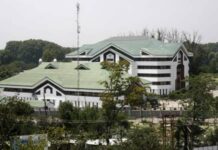By Zaid Irshad Qureshi
Today, anti-Indian dissent in Kashmir is partly indigenous, partly Pakistan sponsored, and a small part of it is radicalized and global, envisioning Kashmir’s future being a part of an Islamic caliphate. The protracted history of Pakistan-sponsored militancy’s attempts to usurp the indigenous movement is being challenged by the newly established third stream that seeks to convert the separatist militancy into a transcendental religious mission with a pan-Islamist goal. Apart from being a part of the large issue of militancy that New Delhi must tackle to stabilize Kashmir, this third stream poses an existential challenge to the pro-Pakistan separatists and militants.

In the pipeline
The thought process behind the third stream has been evolving through relatively “innocuous” acts like waving the flag of Islamic State , since 2015. Despondent with the directions of militancy and its rather gloomy objective of making Kashmir a part of Pakistan, this new stream of militancy aims at providing a new lease of life to the struggle for independence, although the prospects of its success are as hopeless as the movement supported by the Pakistani agencies.

Hizbul Mujahideen (HM) commander Zakir Rashid Bhat alias Zakir Musa was the first to repudiate a merger with Pakistan as the objective of the Kashmiri militancy. His subsequent expulsion from HM notwithstanding, such public repudiation of the end game of the Pakistan-based militant leadership and the separatist Hurriyat formalized the founding of the third stream of militancy in Kashmir. In the last week of July, the al-Qaeda in the Indian subcontinent’s new affiliate for Kashmir, Ansar Ghazwat-ul-Hind, designated Musa as its chief.
The ‘trap’ of Ansar Gazwat-ul-Hind

“Do not fall into the trap of Ansar Gazwat-ul-Hind,” warned Riyaz Naikoo commander of the HM, at the funeral of two militants in South Kashmir’s Tahab in the last week of July 2017. He rejected the call given by Zakir Musa and the arrival of Al-Qaeda in Kashmir. “Linking our struggle with Al-Qaeda and ISIS is a strategy to defame our struggle,” he said. “Pakistan flag is our flag,” said Naikoo in his speech. There is significant support for Naikoo and the HM/LeT brand of militancy. The arrival of the “third stream” is a source of worry to the separatists .The separatist Hurriyat has described the Al-Qaeda’s arrival in Kashmir as a handiwork of the Indian agencies.

Such propaganda would have gone unchallenged without Zakir Musa, who continues to lead a mini revolution of sorts. Musa’s support base spectacular. may not be But on occasions he has managed to attract enough attention to trouble the separatists and the Pakistan-based militants. Musa’s denunciation of Pakistan and his campaign against hoisting its flag during militant funerals in some parts of the valley including Srinagar has borne fruit on a few occasions. According to a report on July 19, group of youth tossed away the Pakistan flag during the funeral of Sajad Gilkar, a militant from downtown Srinagar and wrapped the body with a flag resembling that of the Islamic State.

The fact that Abu Dujana and Arif Lelhari had switched sides to join the Al-Qaeda and an announcement to that effect was in the offing, was confirmed by Musa. Musa’s growing stature and the line he toes makes him a thorn in the flesh for the LeT and/or the HM.
Counter-insurgency successes
More than 120 terrorists had been killed this year by the security forces in Kashmir, the highest in the last seven years. At least 87 of them are from Pakistan. According to New Delhi’s reasoning a headless militant movement will allow it the opportunity to undertake other measures. Less militancy would necessarily mean fewer encounters and less dead bodies of militants for the public to rally around. From a counterinsurgency perspective, however, keeping Zakir Musa alive, at least for the time being, would make sense.

While his minimal contribution to the level of militancy would not bother the security establishment, his repeated statements vowing for an Islamic Kashmir and his ability to split and weaken the Pakistan-sponsored militancy could be of some use to the security forces.
(Ideas expressed are author’s own. It is an opinion piece.)















